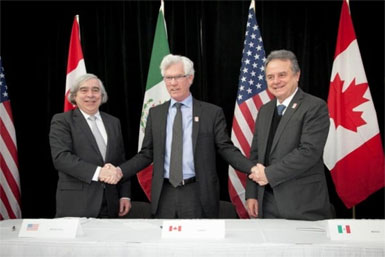In an exciting move, the US, Canada and Mexico took first steps last week toward a North American accord on clean energy and climate.
US Secretary of Energy Moniz signed a Memorandum of Understanding with his counterparts that begins "a continental approach to energy."
Canada’s Natural Resources Minister Jim Carr says the three countries are committed to a "bold vision" for the continent – one that leads us to a low-carbon future, and strengthens energy security and environmental stewardship.

Key areas for collaboration are: creating a continental smart grid; accelerating innovation in clean energy technologies; ramping up energy efficiency; reducing fossil fuel emissions; adapting to climate change through increased resiliency. There could also be a continent-wide infrastructure for electric cars.
One major project is already complete since a working group launched last May. For the first time, the energy infrastructure of North America has been mapped on a web platform. It includes renewable energy and natural gas infrastructure.
"Our challenge, even as we struggle with low oil and gas prices deferred projects and painful job losses is to use this very low spot in commodity cycle to make transformational changes, to find that sweet spot between resource development and environmental stewardship," Carr told reporters.
Prime Minister Justin Trudeau plans to talk about a continental energy strategy when he meets with President Obama next month.
This would never have been possible under Canada’s previous prime minister, Harper – who was only interested in tar sands pipelines – and is unfortunately quite doubtful if Republicans take over in 2017.
"It’s still early days, but if this agreement evolves into a continental climate pact that has the same kind of enforcement teeth as trade agreements have now, it will be a leap in the right direction," Keith Stewart of Greenpeace Canada told Calgary Herald.
"We’re finally moving the conversation beyond oil and Keystone, and we’re starting to talk about the type of energy our world needs and that our science demands," Mike Hudema of Greenpeace Canada told CBC News.
"For years the American government has been trying to talk to Canada about clean energy and unfortunately they kept hearing back about pipelines. It was a bit of a dialogue of the deaf. Now, we are finally catching up to where our allies are," Clare Demerse of Clean Energy Canada told CBC News.
"Today is an important milestone in the global shift to a clean energy economy," states Jean-François Nolet of the Canadian Wind Energy Association (CanWEA). "The MOU reflects a step change in ambition for action in Canada and across North America that will have a tremendous impact on our ability to go beyond reducing greenhouse gas emissions from electricity generation. It promises opportunities to move toward the much deeper cuts needed across other sectors that stand to be electrified with clean, zero-carbon renewables like wind energy. The more Canada expands and integrates electricity grids across borders, the more reliable, resilient, cost-effective and competitive our markets become, which means lower costs for Canadians, and more investment, innovation and jobs in the new green economy."
Read our article, Canada Charts New Path, An End to Tar Sands Pipelines?
Read the MOU:
